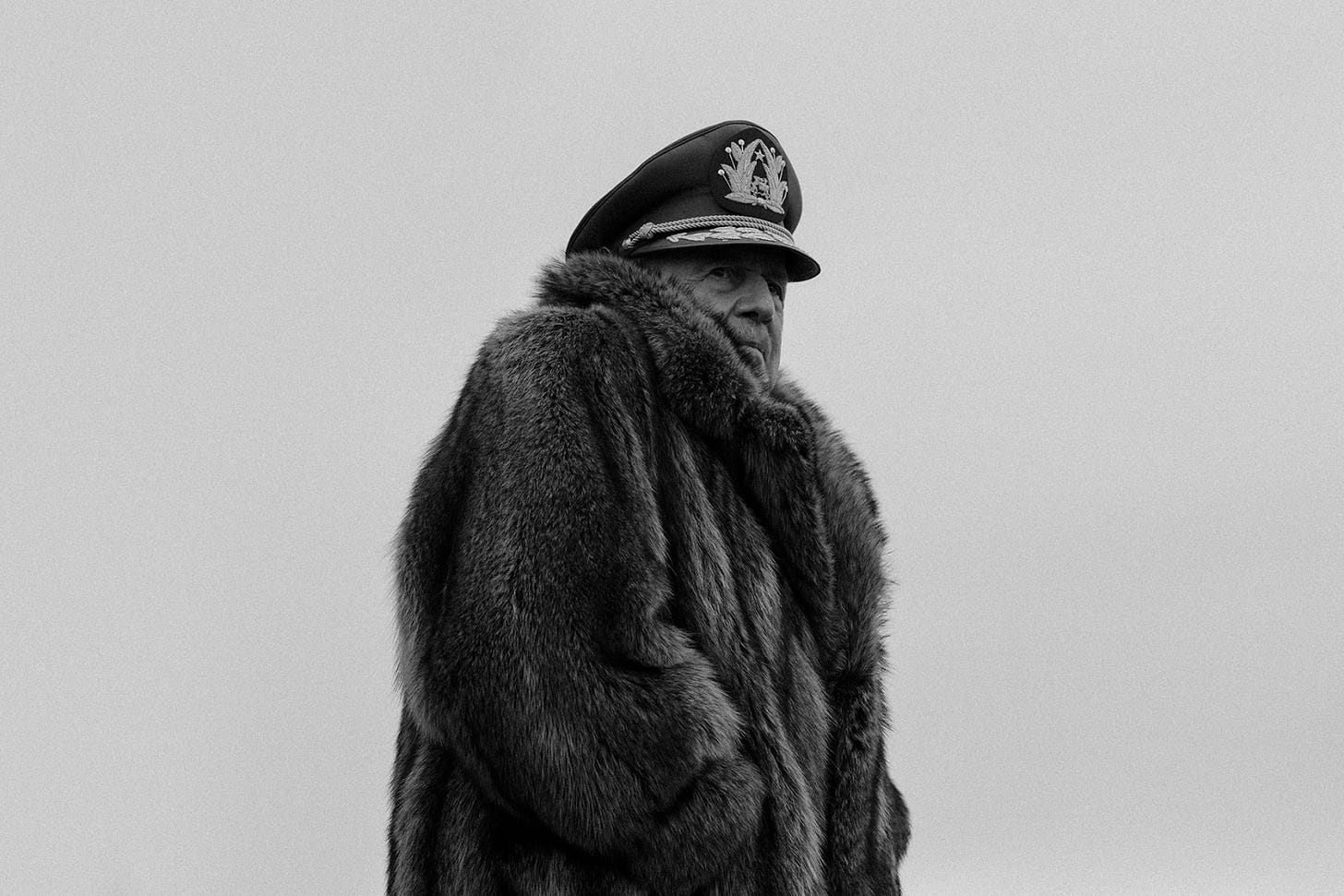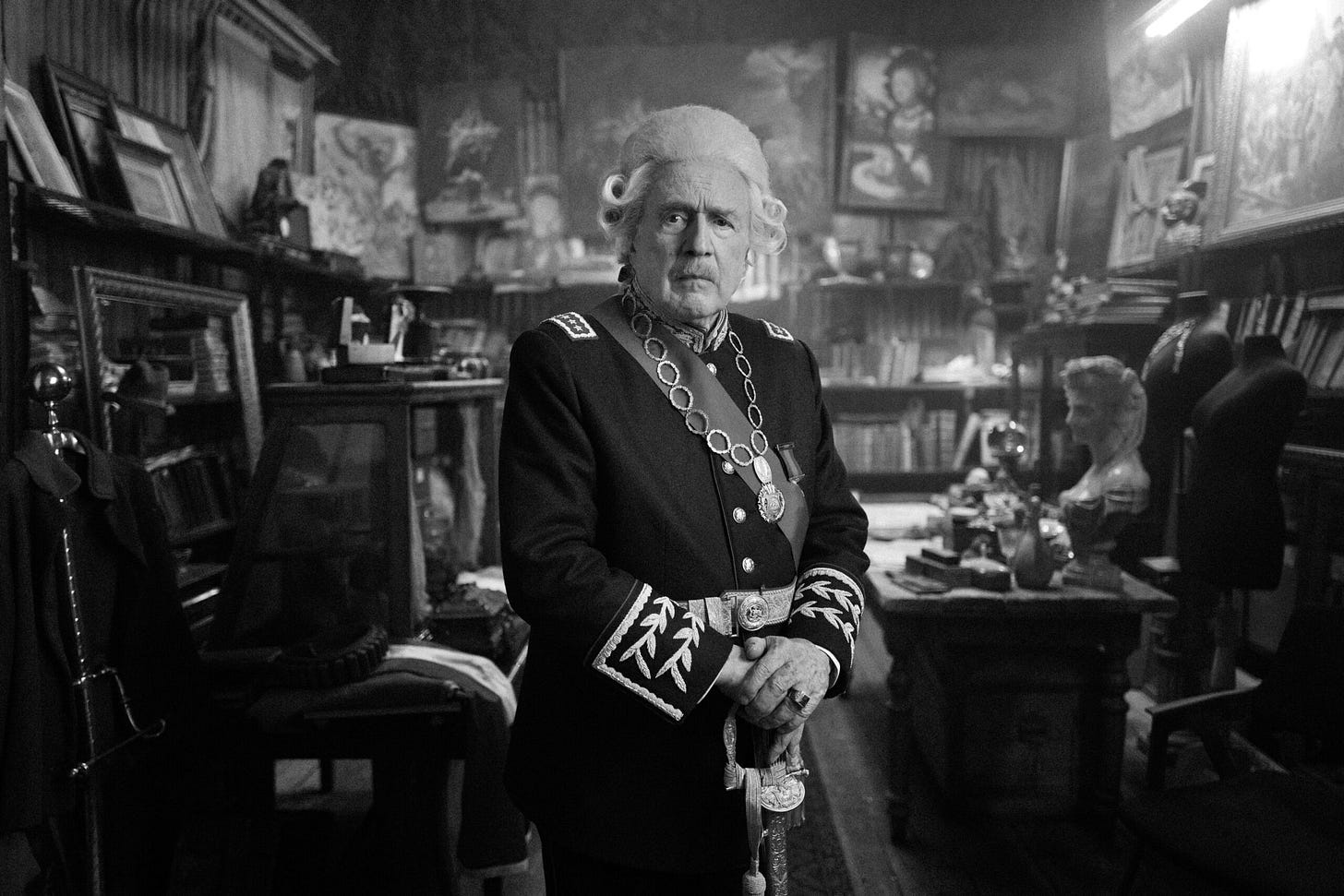Why Netflix's New Vampire Movie Is Also About Right-Wing Politics
In Pablo Larraín's "El Conde", Chilean autocrat Augusto Pinochet is a 250-year-old bloodsucker with a penchant for authoritarian oppression.
Note: the final two paragraphs of this review contain spoilers for the ending of El Conde.
From 1973 to 1990, Augusto Pinochet Ugarte ruled over Chile through a military regime defined by political persecutions, internments, and human rights violations with victims approximating 30,000 people. That same military regime overthrew the democratically-elected president Salvador Allende, then continuing to remain in power until international pressure (and a 1988 plebiscite) forced him out. Yet even after his death, the traumas of Pinochet’s reign persist. He never stood trial after leaving office, was never convicted for the 300-plus criminal charges still pending against him, never reconciled the pain he inflicted on the Chilean people.
That’s a long shadow to cast over a nation’s history, and it’s one that director Pablo Larraín—the Chilean filmmaker perhaps best known to American audiences for the psychological dramas Jackie and Spencer—has been exploring for the past decade and a half. He has grappled with the Pinochet regime in films like Tony Manero, Post Mortem, and No: intimate character portraits of wiry, unemotional Chilean men with grisly interest in the political repression that surrounds them. It’s not surprising, then, that Larraín’s new film El Conde (available now on Netflix) focuses once again on the famed Chilean dictator. What is surprising is that for the first time in Larraín’s Pinochet-obsessed filmography, Pinochet himself is the protagonist.
Oh, and he’s also a vampire.
According to El Conde (meaning “The Count” in Spanish), Pinochet is not the Chilean politician from Valparaíso, but instead a royalist Frenchman born at the height of the French Revolution. He first came of age upon watching the beheading of Marie Antoinette, licking the blood off of her freshly-chopped guillotine. He became a man when he swore to use his vampiric powers put an end to revolutions everywhere—a right-wing autocrat since birth. It’s a funny conceit, and a politically resonant one, though it would surely be considered trashy gimmickry in any other movie. Again: this is a movie that posits a famous dictator as a literal vampire. But Larraín, having earned his arthouse chops, has achieved enough status to have us take seriously this art film in which Pinochet is a 250-year-old bloodsucker with a penchant for authoritarian oppression.
And why not? El Conde is rendered with all the nihilistic trappings of Larraín’s previous works, this time slightly more unevenly than before. Jamie Vadell plays the aging autocrat, a man living out his golden years after having faked his own death in 2006. He lives on an island off the Patagonian coast that is constantly shrouded in mist—a monster movie mansion if there ever was one—and lives a mostly solitary existence save his two longtime companions: his wife Lucia (Gloria Münchmayer) and servant Fyodor (the great Alfredo Castro). Both of them agree that the Chilean public have failed to appreciate the general’s impressive achievements. This is the man who brought his country to order! The man who cleansed it of a Bolshevik infestation! The king who saved Chile from poverty and violent revolutionaries!
Pinochet himself isn’t as convinced that his life is worth that much. “Why would I want to keep on living in a country where people hate me?” he asks early in the film, knowing full well how his image has been tarnished in the years since his reign. This, and the burden of two and half centuries is getting to him—he has decided to commit slow suicide as only vampires can, by ceasing the intake of human blood. But all the hangers-on want him to stay alive. His wife, who has long wanted to him to give her the bite of eternal life, secretly puts blood in his soup. His five children, long expecting inheritance like the Roys on Thanksgiving, show up unannounced in the hopes of snagging old wealth. Even the young nun Carmen (Paula Luchsinger), who the children hire to exorcise the vampirism out of Pinochet, ends up falling prey to the promises of a retired dictator’s embezzlement money.
All this striving after a dead man’s money is what keeps El Conde’s plot machine chugging along, and while it is thematically fitting in a Succession sort of way (what with the whole “aging patriarch fends off greedy kids from stealing his empire”), it isn’t enough to keep the film entertaining as it should. The film’s script, by Larraín and Guillermo Calderón, doesn’t have the kind of zing that is found in other, more compelling satires of elder statesmen and their vacuous subordinates. (Think the Death of Stalin, for instance.) It all results in a middle section that philosophizes on the lustful character of Pinochet and his five children rather aimlessly, wandering through its characters’ inner lives without a compelling satirical engine to push it forward. In other words, it lacks bite—a substantial problem for a film about dictatorial vampires.
Luckily, the film’s aesthetics pick up the slack. Edward Lachman’s lush black-and-white cinematography is staggeringly beautiful, amplifying the film’s already potent air of empty greed. The design of Pinochet’s creaky island residence is similarly compelling, with visuals that straddle the line between fascist nostalgia and the crumbling remains of Dracula’s castle. The film’s performances elevate its often lackluster script: actors like Vadell, Luchsinger, and Castro effortlessly tow the line between satirical lampoonery and historical substance.
El Conde is at its best when connecting the dots between its monster movie premise and real-world political figures, a tendency most clearly displayed in a brilliantly audacious reveal made late in the film. After plenty of internecine bickering amid the Pinochet family, some inner-city drinking of human blood, and sex with a nun, El Conde reveals that the film’s narrator—a mysterious English-speaking woman commenting vapidly and omnisciently on the Pinochet family squabbles—is actually Margaret Thatcher. And also a vampire. And also—get this—Pinochet’s mother. It’s an amazingly audacious left turn for a film already built on the absurd premise of dictator-vampires, but it works brilliantly because it extends Larraín’s vampire metaphor outwards from Chilean history and towards a more general view of right-wing politics as insidious monstrosity. In El Conde’s telling, Pinochet has been fighting revolutionaries since the French Revolution (his original name was “Auguste Pinoche”), travelling to Haiti, to Russia, to Algeria to keep the monarchs in power and hierarchies in order. The fact that his mother happens to be Thatcher—the ruthless conservative British prime minister who helped pivot the world towards neoliberalism—does immense work in bridging significant between strongman dictatorships and repressive conservatism on the whole.
The film concludes with Pinochet deciding to live again: to be reborn as a child in Chile, with his mother Margaret standing proudly at his side. El Conde transitions out of its drab black-and-white color palette into vibrant color in this sequence as we see Pinochet deciding to reenter Chilean society under a new guise. “He says that the most dangerous leftists of all are right here,” intones Thatcher with mild disgust, uncertain at the prospect of living in a “country of rubble.” The meaning is clear enough: even though Pinochet as we know him has come to his end, he and those like him will always be reborn under a new image. And in fact, they already have—you can see it today in right-wing conspiracy parties which base their political philosophy on a fear of dissent rather than a means of building forwards. El Conde knows it. Like any good satire, it doesn’t have to state its message out loud to make itself known.






Someone I recently met grew up in Chile, and I heard her story about having to leave the country in the 1970's when she was about 13 because so many of the adult men in her life "were disappeared" (as they described it) by Pinochet. So this story caught my eye.
The imagery of the abusive, destructive right wing dictator as being almost impossible le to kill - even when it's what he himself chooses, is appropriately powerful. Is it ever possible to eliminate the ugly, most base elements from the human experience? I think an eternal, almost-impossible to kill vampire is an apt choice for what this character and others like Pinochet represent.
Ciao James,
this sentence seems to me incomplete: "That same military regime overthrew the democratically-elected president Salvador Allende". it should read : "That same military regime, with the support of the USA who played an instrumental role in overthrowing the democratically-elected president Salvador Allende, fearing to have a socialist government in their backyard, and having their financial interests threatened by socialist politics". I recommend the reading of Naomi Klein's The Shock Doctrine: The Rise of Disaster Capitalism. Quite enlightening about the role of the CIA in overthrowing Salvador Allende. I guess this series does not mention any of that.